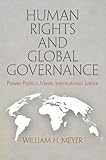Human Rights and Global Governance : Power Politics Meets International Justice / William H. Meyer.
Material type: TextSeries: Pennsylvania Studies in Human RightsPublisher: Philadelphia : University of Pennsylvania Press, [2019]Copyright date: ©2020Description: 1 online resource (280 p.) : 5 illusContent type:
TextSeries: Pennsylvania Studies in Human RightsPublisher: Philadelphia : University of Pennsylvania Press, [2019]Copyright date: ©2020Description: 1 online resource (280 p.) : 5 illusContent type: - 9780812251760
- 9780812296648
- 323 23
- JZ1318 .M48 2020
- online - DeGruyter
- Issued also in print.
| Item type | Current library | Call number | URL | Status | Notes | Barcode | |
|---|---|---|---|---|---|---|---|
 eBook
eBook
|
Biblioteca "Angelicum" Pont. Univ. S.Tommaso d'Aquino Nuvola online | online - DeGruyter (Browse shelf(Opens below)) | Online access | Not for loan (Accesso limitato) | Accesso per gli utenti autorizzati / Access for authorized users | (dgr)9780812296648 |
Frontmatter -- Contents -- List of Abbreviations -- Introduction -- Chapter 1. The Pinochet Precedent as an Exemplar of Global Governance -- Chapter 2. Indigenous Rights and Global Governance -- Chapter 3. Corporate Social Responsibility and Global Governance -- Chapter 4. Testing Theories of Labor Rights and Development -- Chapter 5. Torture, Terror, and Unjust Wars -- Chapter 6. Human Rights Treaties and the Pacific Interregnum -- Chapter 7. Two Models and Future Prospects for Global Governance of Human Rights -- Notes -- References -- Index -- Acknowledgments
restricted access online access with authorization star
http://purl.org/coar/access_right/c_16ec
International human rights has been an important matter for study, policy, and activism since the end of World War II. However, as William H. Meyer observes, global governance is not only a relatively new topic for students of interational relations but also a widely used yet often contested concept. Despite the conflicting and often politicized uses of the term, three key dimensions of global governance can be identified: the impact of diplomatic international organizations such as the International Criminal Court, the importance of nonstate actors and global civil society, and global political trends that can be gleaned from empirical observation and data collection. In Human Rights and Global Governance, Meyer defines global governance generally as the management of global issues within a political space that has no single centralized authority.Employing a combination of historical, quantitative, normative, and policy analyses, Meyer presents a series of case studies at the intersection of power politics and international justice. He examines the global campaign to end impunity for dictators; the recognition, violation, and protection of indigenous rights; the creation and expansion of efforts to ensure corporate social responsibility; the interactions between labor rights and development in the Global South; just war theory as it applies to torturing terrorists, war crimes in Afghanistan and Iraq, and the drone wars; and the global strategic environment that best facilitates the making of human rights treaties. Meyer concludes with an evaluation of the successes and failures of two exemplary models for the global governance of human rights as well as recommendations for public policy changes and visions for the future.
Issued also in print.
Mode of access: Internet via World Wide Web.
In English.
Description based on online resource; title from PDF title page (publisher's Web site, viewed 21. Jun 2021)


